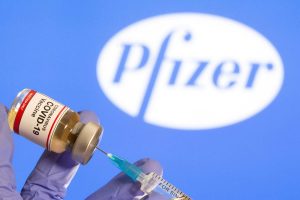The first dose of the Pfizer vaccine is 85% effective, Israeli study finds

- The first dose of Pfizer and BioNTech’s coronavirus vaccine is 85% effective, Reuters reported.
- The UK government has already prioritized the first dose scheme over the two-shot scheme.
- The European Medicines Agency and the FDA are against delaying the second vaccine dose, however.
- Visit the Business section of Insider for more stories.
The first dose of Pfizer and BioNTech’s coronavirus vaccine is 85% effective at preventing COVID-19, researchers in Israel found, according to a Reuters report.
The findings from the Sheba Medical Center examined 7,214 hospital employees who received their first dose in January.
Israel is looking to immunize everyone in its population above the age of 16 by March 2021,
They found an 85% reduction in symptomatic cases of COVID-19 within 15 to 28 days after the first shot, with an overall reduction of infections, including asymptomatic cases detected by testing, of 75%, according to Reuters. Two Canadian researchers Danuta Skowronski and Gaston De Serres had previously detected that this reached 92.6% efficiency, according to another Reuters report that cited data from a US trial.
“Even before the second dose, BNT162b2 was highly efficacious, with a vaccine efficacy of 92.6%,” they said in a report published in The New England Journal of Medicine.
The EMA and the FDA are against delaying the second vaccine dose
The researchers urged delaying the second dose in order to maximize the deployment of a first dose, which appears highly effective in preventing COVID-19.
The UK government has already prioritized the first dose scheme over the two-shot scheme; at present, however, the European Medicines Agency (EMA) and the US Food and Drug Administration (FDA) are against delaying the second dose of the vaccine.
Pfizer has said we should use the shot as it was studied, but acknowledged that the vaccine is administered is ultimately up to health authorities in each country, according to Reuters.
The reason European regulators have not been in favor of changing the two-dose strategy is due to exposure to contagion and the possibility of causing the virus to mutate by exposing it to low antibody pressure, Dr. Paul Offit, director of the Vaccine Education Center at Children’s Hospital of Philadelphia told CNBC.
Ugur Sahin — CEO of BioNTech, the firm that produced data on the Pfizer vaccine, the first effective coronavirus shot — explained how the company approached vaccine development at speed without taking any shortcuts.
Healthcare Explained:
Telehealth Industry
Value-Based Care
Senior Care & Assisted Living Market
Medical Devices & Wearable Tech
AI in Healthcare
Remote Patient Monitoring
Get the latest coronavirus business & economic impact analysis from Business Insider Intelligence on how COVID-19 is affecting industries.
Source: Read Full Article
